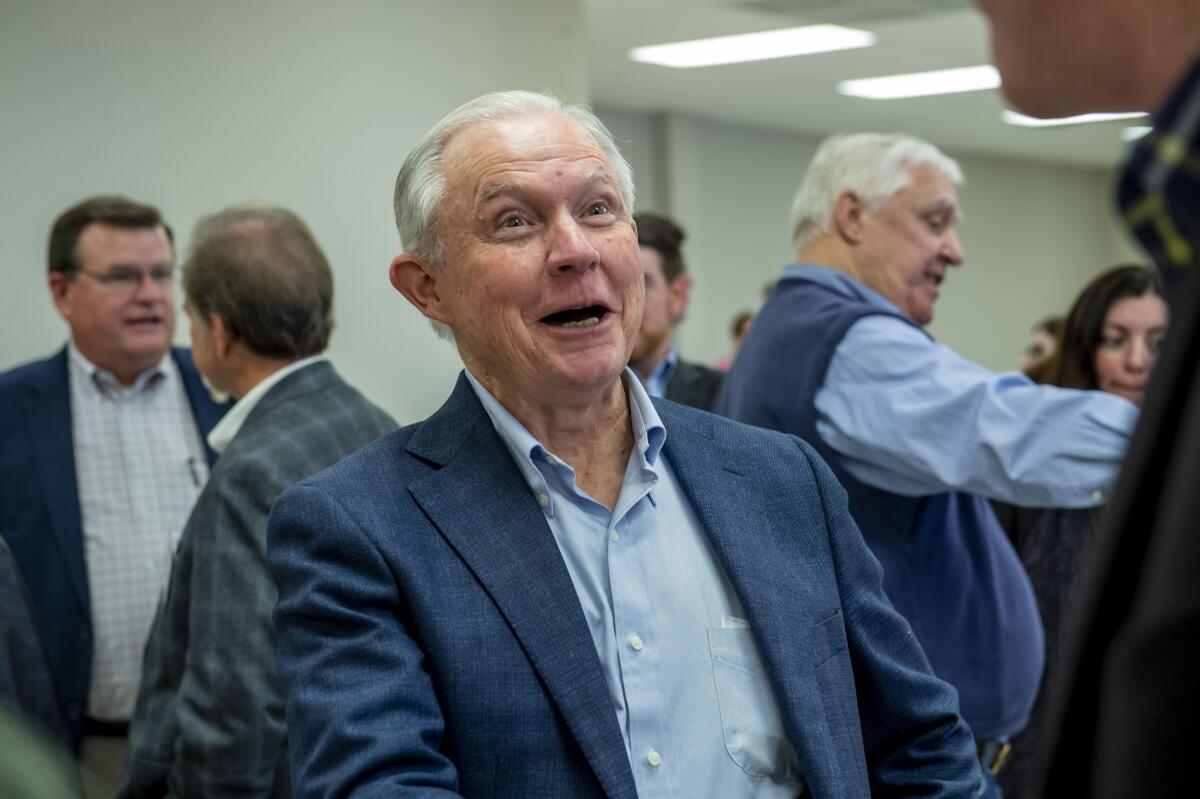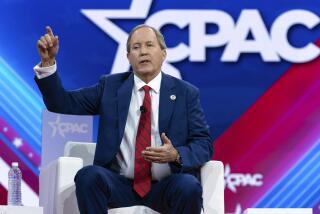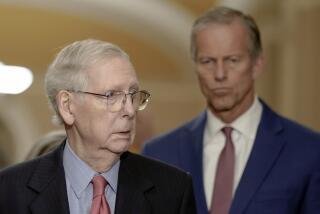Cast out by Trump, Jeff Sessions struggles in Alabama to win back a Senate seat

For a man who was once the most popular politician in Alabama, Jeff Sessions cut a lonely figure as he slipped into a packed room of Republicans this weekend to urge them to help him return to the Senate.
When the 73-year-old former senator and, more recently, President Trump’s attorney general arrived at the Vestavia Hills Civic Center for a breakfast hosted by the Jefferson County Republican Party, a few party loyalists shook his hand and exchanged pleasantries. But many barely glanced at Sessions as they sipped coffee and poured Aunt Jemima syrup onto paper plates stacked with pancakes and bacon.
“I don’t have anything to say to him,” Jimmy Carmack, 67, a beekeeper from Center Point, said with a shrug as he watched Sessions stand awkwardly at the edge of the room making small talk with voters. “He’s had his time and we’re ready for someone else.”
Sessions, who supported Trump long before other Republican leaders took the former reality-TV star seriously, ironically finds himself at a disadvantage in Tuesday’s Republican primary, after a race that has been something of a contest for who is the most pro-Trump Republican.
In this solidly red state, where Trump beat Hillary Clinton in 2016 by 27 percentage points, the humbling of Sessions underscores just how fully the president dominates his party.
In the days before the Republican primary on Tuesday, he met a lukewarm reception from many longtime supporters as he struggles against several rivals for the nomination to challenge Sen. Doug Jones, the Democrat who won a special election in 2017 when Sessions left the Senate for the Trump administration.
In the years since, Alabama Republicans have listened to Trump’s ridicule and mockery of Sessions for his decision early in the administration to recuse himself from the Justice Department’s investigation into the Trump campaign’s dealings with Russia. In November 2018, Trump demanded Sessions’ resignation.
While Sessions said he was following the law and ethics advisors’ guidance — as an official in the Trump campaign, Sessions arguably had a conflict of interest in overseeing the Russia investigation as head of the Justice Department — Trump saw it as a betrayal. The president, who virtually never acknowledges missteps, called his decision to hire Sessions his “biggest mistake.”
So far, Trump has not endorsed any candidate in the Republicans’ race.
Polls show Sessions leading over political newcomer Tommy Tuberville, a former Auburn University football coach, and U.S. Rep. Bradley Byrne of Mobile. Trailing at a distant fourth place is Roy Moore, the controversial former Alabama Supreme Court chief justice who lost the 2017 election to replace Sessions after allegations of improper sexual contact with young girls years ago.
However, the polls suggest that Sessions does not have enough support to win the race outright. If no candidate secures more than 50% of the vote, the top-two candidates will compete in a runoff election March 31. Should Sessions be forced into a runoff, the question is whether Trump will then weigh in — and for which candidate.
“This is a fight for his political life and I don’t know how it comes out,” said Quin Hillyer, a conservative commentator for the Washington Examiner based in Mobile. “There’s a lot of residual goodwill for him, but the level of enthusiasm, even among those with goodwill, seems much reduced since all of Trump’s attacks.”
To be sure, some Republicans say Sessions continues to have their loyalty.
“He’s been a very solid senator,” said Betty Zeitz, a 77-year-old owner of a cattle farm near the city of Calera. “He is decent, he is experienced and he’s very strong on all conservative issues, especially immigration.”
But many former supporters said it was time for Sessions to step aside.
“I think he did Trump harm,” said Judy Hamrick, 66, a retired nurse practitioner from Trussville who has known Sessions for decades but plans to vote for Tuberville. “I think the swamp got to him. I respect him…I just don’t think I could send him back.”
Even some who greeted Sessions — shaking his hand or patting him on the back — admitted they would not actually vote for him.
“I just think he’s tired and he’s rundown and Washington wore him out,” said Matt Carroll, 47, a salesman from Birmingham who said he campaigned for Sessions to be state attorney general back in 1994 and voted for him in every election, until now. He plans to vote for Tuberville or state Rep. Albert Mooney, another candidate for the Senate nomination.
“I actually would hate to see him get beat, to be honest, but I think that’s what’s going to happen,” Carroll said. “The majority of the people in this room won’t vote for him.”
Sessions was the first U.S. senator to endorse Trump — a fact he emphasized in November when he announced his decision to run again for the Senate. He broadcast a video showing him on the campaign trail with Trump and putting on a “Make America Great Again” cap, and emphasized his continued loyalty to the president.
“When I left President Trump’s Cabinet, did I write a tell-all book? No,” Sessions said in the video. “Did I go on CNN and attack the president? Nope. Have I said a cross word about our president? Not one time.”
But his opponents have emphasized their own Trump-supporting credentials while pointing out the president’s rift with Sessions. One Tuberville campaign ad shows Trump expressing regret that he ever appointed Sessions as attorney general. A Byrne ad states that Sessions “let the president down and got fired,” and “Hillary still ain’t in jail.”
Sessions has not been in a close race for decades, since he first ran for the Senate in 1996 as a former U.S. attorney. By 2014, when he ran for a fourth term, he seemed so invincible that no one, Republican or Democrat, ran against him.
Wayne Flynt, professor emeritus of history at Auburn University, said that even if Sessions gets the nomination, Trump’s denunciations of him could prove damning in a general election.
“In a normal cycle, he would be a shoo-in,” Flynt said. “The conundrum for Sessions is this: tie yourself to a man who denounced you as the worst appointment he ever made and as a total failure as attorney general, all of a sudden the Democrats are going to be using Trump’s words against the Republican nominee.”
Sessions acknowledges that the barrage of criticism has gotten to him.
“It offends me and irritates me to have people say, ‘You’re just a career politician… you sold out, you quit working, you’re part of this establishment, you lost contact,’” he told a couple dozen voters who met with him Saturday at Lloyd’s restaurant in Birmingham.
As senator, he told them, he would continue to work to protect their interests and advance Trump’s hard-line agenda on trade, law and order, and immigration.
“If you think I’ve gone sorry, lazy and sold out, then don’t vote for me,” he said. “I would just say this: I do not plan to be a potted plant. I have gained some ability, I think, to be more effective now than I was before.”
More to Read
Get the L.A. Times Politics newsletter
Deeply reported insights into legislation, politics and policy from Sacramento, Washington and beyond. In your inbox three times per week.
You may occasionally receive promotional content from the Los Angeles Times.







